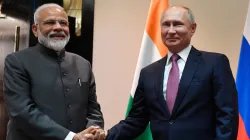Russia likely to allow free visa entry to Indians: Here's how it will strengthen ties with New Delhi
While India, under PM Modi, has maintained its diplomatic autonomy in dealing with Russia, Moscow also has stood the test of time in taking the relationship forward, attaching similar importance to New Delhi.

In what comes as a significant update for visitors planning to go Russia, Moscow is likely to allow visa-free travel to Indians. A new system is expected to be put in place in 2025, facilitating the smooth travel of Indians to Russia. The development becomes particularly important in the backdrop of prolonged tensions between Russia and Ukraine, which has had its spillover impacts on the entire Europe, with the US pressurising nations to maintain distance from Moscow. While India has maintained its diplomatic autonomy in dealing with Russia, Moscow too has reciprocated with the same degree, attaching similar importance to New Delhi.
Notably, India and Russia have been engaged in talks since June to ease visa restrictions for each other, reports suggest.
In a statement, chairman of the Moscow City Tourism Committee, Evgeny Kozlov, said, "It is predicted that thanks to the agreement, which is now under development, the number of travellers from India coming to the Russian capital will significantly increase."
Indians eligible for e-visas since 2023
Moreover, Indians have been made eligible to get e-visas since August 2023, which generally takes four days to get processed. Reports also suggest that in 2023, India ranked among the top five countries for the number of e-visas issued, which accounts for 9,500 visas issued to Indian nationals. The majority of Indian travellers to Russia visit the country for business and work purposes.
What's the current scenario for Indian visitors?
Currently, Indian nationals have to undergo an extensive process which involves getting a visa issued by the Russian Embassy or Consulates to enter, stay, and exit from the Russian Federation.
As Russia only extends visa-free entry to China and Iran through its visa-free tourist exchange programme, the new arrangement hints towards India's renewed importance in Moscow's scheme of things.
Another significant point to consider is that with Trump assuming the presidential office in the United States, the travel restrictions are likely to get tightened. Under Trump, the H-1B visa seekers may see increased scrutiny. To substantiate the assertion, the denial rate for H-1B petitions rose from 6 percent in FY 2015 to 24 percent in FY 2018 and 30 percent in FY 2020. Under Donald Trump, the average denial rate for H-1B visas had gone up to 18 percent, a report suggests.
Also Read: 'Fraught with serious risks': Russian foreign ministry warns citizens against travelling to US
